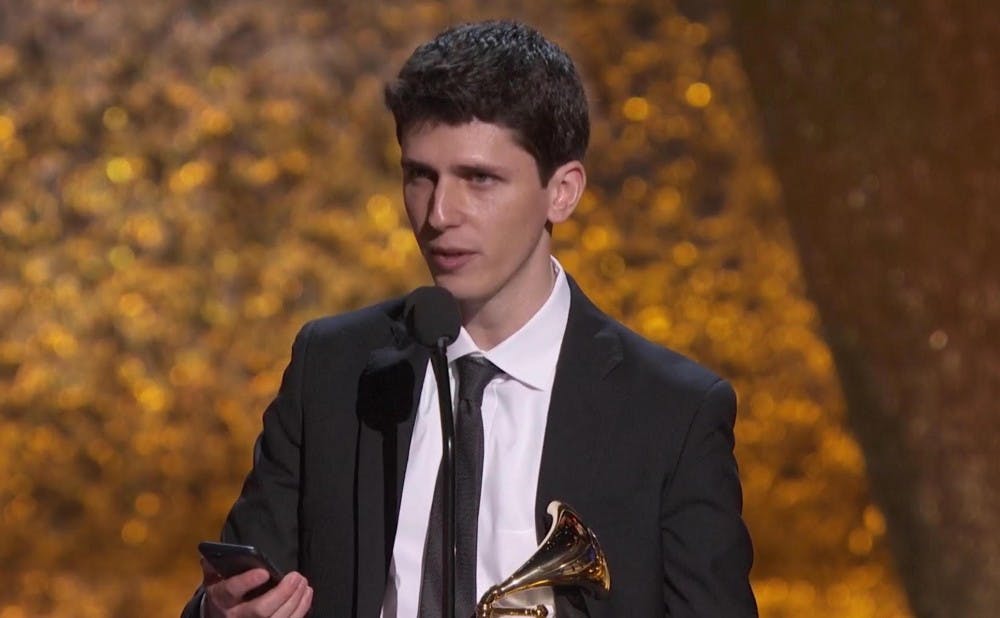When Eric Oberstein ran up on stage two weeks ago to accept his third Grammy award for producing Dafnis Prieto’s album “Back to the Sunset,” one man stood beside him: fellow Duke alum Harsha Murthy.
Although Oberstein, Trinity ’07 and current interim director of Duke Performances, is widely recognized as an accomplished producer in his field, “Back to the Sunset” marks the first album where he collaborated with other Duke alumni. Murthy, Trinity ’81, served as an executive producer for the album and John Hahn, Trinity ’74, served as an associate producer. “Back to the Sunset” was both Murthy and Hahn’s first time working on any professional music project.
“They really became our guides in many ways through this project, both in connecting us with funding and thinking strategically about the project,” Oberstein said. “And I’m so grateful to both of them as friends and mentors.”
Hahn originally reached out to Oberstein after his last Grammy win to learn more about music production. When Oberstein conceived his next project, he reached out to Hahn, who then reached out to Murthy.
Both Murthy and Hahn praised Oberstein’s vision and production abilities in the creation of “Back to the Sunset.” He has won two Latin Grammy awards in addition to his three Grammys.
“We just had tremendous confidence in Eric running the show,” Hahn said. “He’s got a lot of talent, maturity and insight.”
Oberstein was familiar with Prieto’s work before “Back to the Sunset,” as they had both worked with jazz musician Arturo O’Farrill, with Oberstein working as a producer and Prieto composing a number of pieces for him. Prieto also won the MacArthur “Genius" Fellowship in 2011.
So when Oberstein was considering collaborations for his next big project in the spring of 2016, Prieto’s name rose to the top of his list.
“Having primarily produced big band albums prior to that, I felt very comfortable in pursuing that project with him,” Oberstein said. “I knew that it would be a heavy lift, because big band projects are the more ambitious and expensive albums that one can do. But at the same time, the opportunity to collaborate on something that he really wanted to do and that he could showcase his talents as a composer with, that was incredibly exciting to me.”
Prieto was born in Cuba, moved to New York City in 1999 and has been performing and working in the United States since then. He is currently a faculty member at the Frost School of Music at the University of Miami.
On “Back to the Sunset,” Prieto wanted to honor all of the musicians who inspired him. Each track is dedicated to a different set of artists who influenced him, including Chico O’Farrill, Arturo O’Farrill’s father.
“The story of the album is about honoring these mentors and influences and giving him an opportunity to assemble a brand new band,” Oberstein said.
The big band included five saxophones, four trumpets, four trombones, a pianist, a bassist, a percussionist and Prieto playing the drums.
Oberstein specializes in big band albums, having previously produced six of Arturo O’Farrill’s albums. Big band albums tend to be more ambitious from the logistical perspective due to the number of people involved. But the variety of voices in big band is exactly what makes it special for Oberstein.
“The thing I love about big band is that it provides such a large musical palette for the composer,” he said. “In some ways, it’s like an orchestra for jazz, in that there are so many voices.”
Oberstein produced “Back to the Sunset” through Prieto’s own independent label, Dafnison Music, meriting its own challenges.
Murthy likened self-producing an album to a startup venture. Without a major label to support a project, producers need to gather the musicians, book a studio for recording and raise money.
“And for a big band album, which is what Dafnis Prieto wanted to do, it’s a lot more complicated, because a lot more people are involved,” he said.
Oberstein and Prieto started a crowdfunding campaign through Fractured Atlas to help raise funds for the project, and also applied for grants to cover costs.
“Back to the Sunset” was released April 6, 2018. The album was nominated for a Latin Grammy, in addition to winning the Grammy for best Latin Jazz album.
Get The Chronicle straight to your inbox
Sign up for our weekly newsletter. Cancel at any time.
Oberstein said a recognition like a Grammy could help Prieto and his band secure more touring opportunities, but he emphasized he does not produce music to win awards.
“It’s not why we do this work, but it is a nice acknowledgment of the work and encouragement to keep doing it and keep moving forward with it,” Oberstein said.
As to whether winning a Grammy ever gets old, Oberstein said no.
“Each project is special and unique,” he said.
Duke Performances will present the Dafnis Prieto Big Band March 29 at Baldwin Auditorium as part of their annual Black Atlantic Festival.

